Growing up in a Midwestern inner city led Joe Bozeman to a career understanding how sustainability takes shape for people of many different backgrounds.
(text and background only visible when logged in)
Joe Bozeman III spent much of his youth in inner-city Dayton, Ohio. It was a difficult childhood, where the threat of physical and emotional harm was never far away. Bozeman often lacked access to healthy food and lived in a home where adequate electricity, heating, and cooling were sometimes unavailable or unaffordable.
He bounced between Dayton and its suburbs during middle and high school before landing at nearby Wright State University as an undergraduate student.
It was those tough formative years, Bozeman said, that put him on his career path as an assistant professor in the School of Civil and Environmental Engineering (CEE). His peers often teach and conduct research on innovative building construction, new ways to effectively provide society safe and clean drinking water, sustainable transportation and farming approaches, and a wide range of other topics. Bozeman, however, noticed a gap in integrating social equity into sustainability research.
“I’m attracted to the field of equitable sustainability largely due to those lived experiences and recognition of a sociotechnical gap in academia,” Bozeman said. “I was fortunate that close family members — mostly professional musicians and computer programmers — encouraged me to explore intellectual and scholarly pursuits in music and engineering.”
While he still dabbles in music, Bozeman primarily focuses on equitable sustainability. His peer set isn’t very large — a shortage he laments.
“This is a problem given that engineers influence everything: the homes we live in, the buildings we work in, how we move from point A to B, the quality of our food, and what we drink,” Bozeman said. “This compells me to help fill this gap by using my technology-centric and practitioner expertise to influence how researchers and policy makers, especially from engineering and public policy disciplines, use technical information to make decisions.”
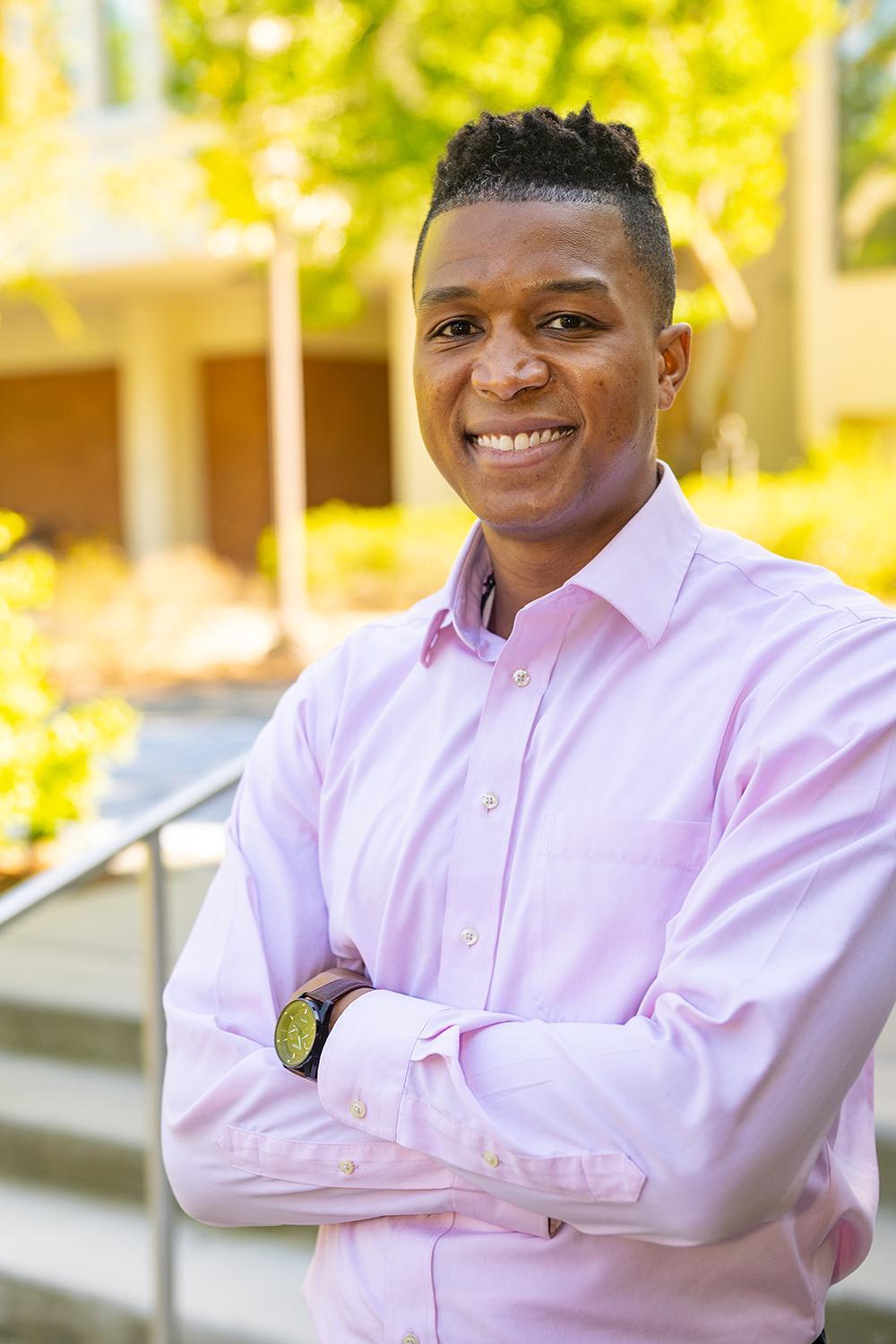
Joe Bozeman (Photo: Candler Hobbs)
Bozeman’s work in equitable sustainability covers a broad range of topics, from electric vehicle (EV) adoption to the impact of food choices on the environment.
One current project focuses on EVs’ impact on communities, including better understanding the effects of more than 50 lithium mining sites in the U.S. Lithium is a key component in EV batteries.
Because EVs are heavier than gas-powered vehicles, Bozeman and researchers from the University of California campuses in Irvine and Los Angeles also are looking at particulate materials shed when drivers of heavy EVs hit the brakes.
“Most people just assume that the air will get better simply by switching to EVs,” Bozeman said. “But when you couple the emissions generated from brake particulate matter with those from mining, we must learn more about how that pollution compares with emissions generated by gas-powered vehicles.”
The project is funded for three years through the Sloan Foundation. In Atlanta, the primary roadway study area is Buford Highway — a 10-mile corridor home to many ethnic groups, businesses, and immigrants. The study also will focus on Los Angeles’ I-710 corridor, where surrounding neighborhoods are disproportionately Black and Hispanic.
(text and background only visible when logged in)
Most people just assume that the air will get better simply by switching to EVs. But when you couple the emissions generated from brake particulate matter with those from mining, we must learn more about how that pollution compares with emissions generated by gas-powered vehicles.
JOE BOZEMAN
(text and background only visible when logged in)
Bozeman recently completed a National Science Foundation-funded project that looks at the likelihood that the public will accept EVs and want to own one. He and collaborators from the University of Pennsylvania and Carnegie Mellon University surveyed 3,000 people across gender, race, and socioeconomic status. They also asked respondents about their level of trust in government and their political leanings.
Their preliminary findings show that ride-share and public transportation commuters are very open to owning EVs, but their actual ownership of one is less than survey respondents who said they prefer driving their own vehicles. They also discovered that political ideology was an important predictor of intent to purchase EVs: people who identified as more liberal had a higher urge to buy. Self-identified conservative respondents expressed less intent.
“This had to do with a person’s willingness to trust that the government will have sufficient charging infrastructure in place for EVs,” Bozeman said. “Understanding how U.S. political ideology and trust in government connects with race and gender is key to developing effective policies that encourage sustainable EV adoption.”
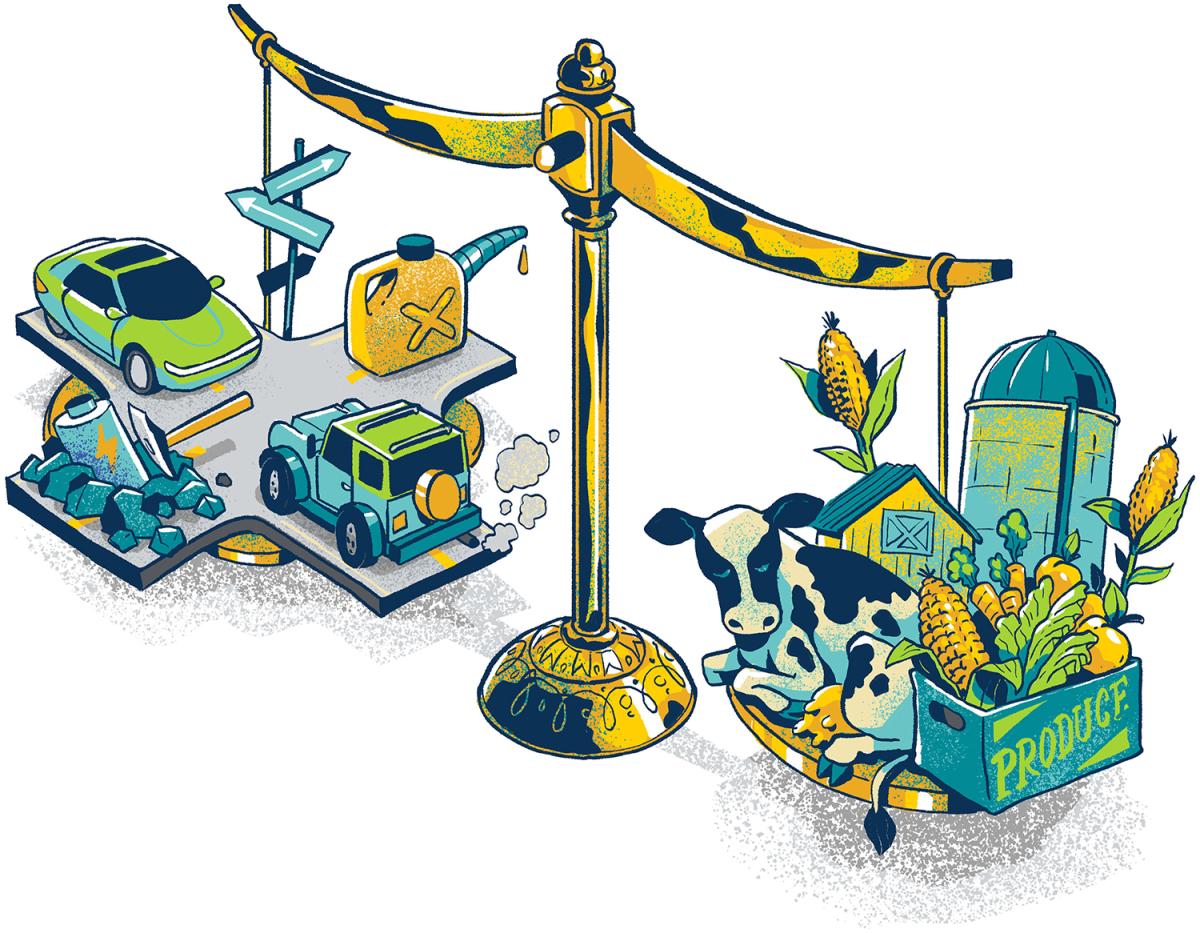
Joe Bozeman’s work in equitable sustainability covers a broad range of topics, from electric vehicle adoption to the impact of food choices on the environment. (Illustration: Charlie Layton)
In other projects, Bozeman looks at food equity and sustainability and how it’s impacted by spending patterns across community types. Because many U.S. neighborhoods are segregated by income class, race, and ethnicity, he said that understanding how distinct majority Black, white, and Hispanic communities affect the physical environment through food spending is important for environmentally concerned policymakers and businesses.
A few years ago, he looked at the dietary habits of white, Black, and Latin Americans. White consumers, on average, had the most greenhouse gas emissions. Bozeman and the research team attributed this mostly to eating a lot of red meat and water-intensive fruit, such as blueberries. Black Americans had the largest impact on land use, largely the result of consumption of land-intensive protein such as poultry and fruits such as oranges.
He then followed that study with another looking at socioeconomics and the environmental effects of the three demographic groups for each dollar they spend on food. He found that the Latino demographic affects land, greenhouse gas emissions, and water the most on average when it comes to what they eat.
“White Americans, on average, make more money than those who are Black or LatinX, who tend to make about the same amount,” Bozeman said. “But when it comes to land, greenhouse gas, and water-intensive foods, LatinX consumers impact the environment the most per dollar spent.”
Bozeman said that’s because they spend more on calorie-dense, highly processed, and environmentally unfriendly food groups.
“They’ll buy in bulk, often out of necessity because of fear of food scarcity and a lack of buying power. White Americans typically have more buying power and freedom. And thus, they’re better able to pick and choose how sustainable their food choices are.”
Bozeman’s said his work provides culturally meaningful data and insights to guide engineers and policymakers — data that are too often lacking or nonexistent. He expects to produce more in this area and to inspire others to do the same.
“My ultimate goal is to provide easy-to-use tools and frameworks to systematize equitable sustainability outcomes in the broad areas of food, energy, and circularity, where we move away from unsustainable and resource-wasteful practices to more sustainable and reuse practices,” he said.
(text and background only visible when logged in)
(text and background only visible when logged in)
Related Stories

Powering Up
Our researchers are creating new technologies that pollute less and store more energy — while also ensuring the manufacturing process is clean.
(text and background only visible when logged in)
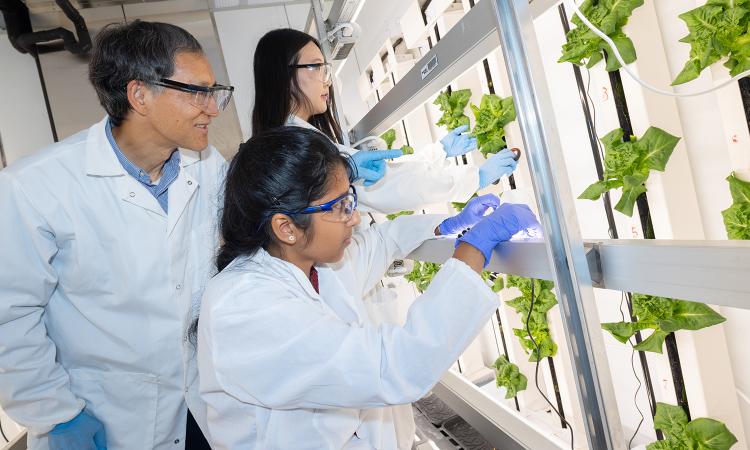
Planting the Seeds of the Farm of the Future
Georgia Tech engineers are working to reduce the environmental impact of farming while creating technologies to help farmers feed a growing world and adapt to a changing climate.
(text and background only visible when logged in)
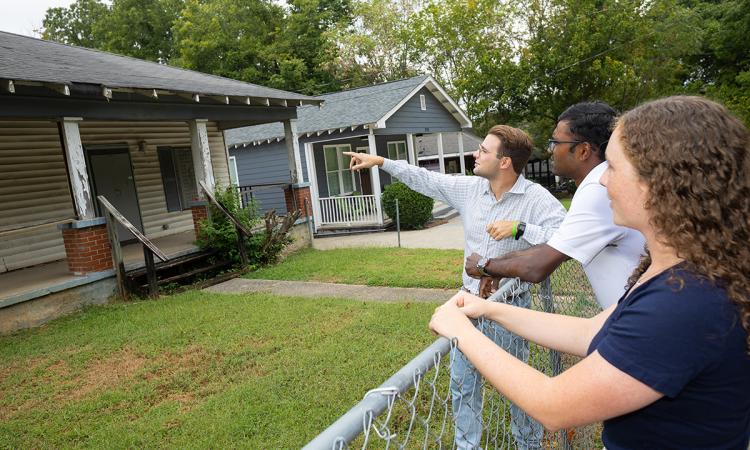
Building a Legacy
What started as a student design for a sustainable building competition soon will be a net-zero-energy home in Atlanta’s historic Vine City neighborhood.
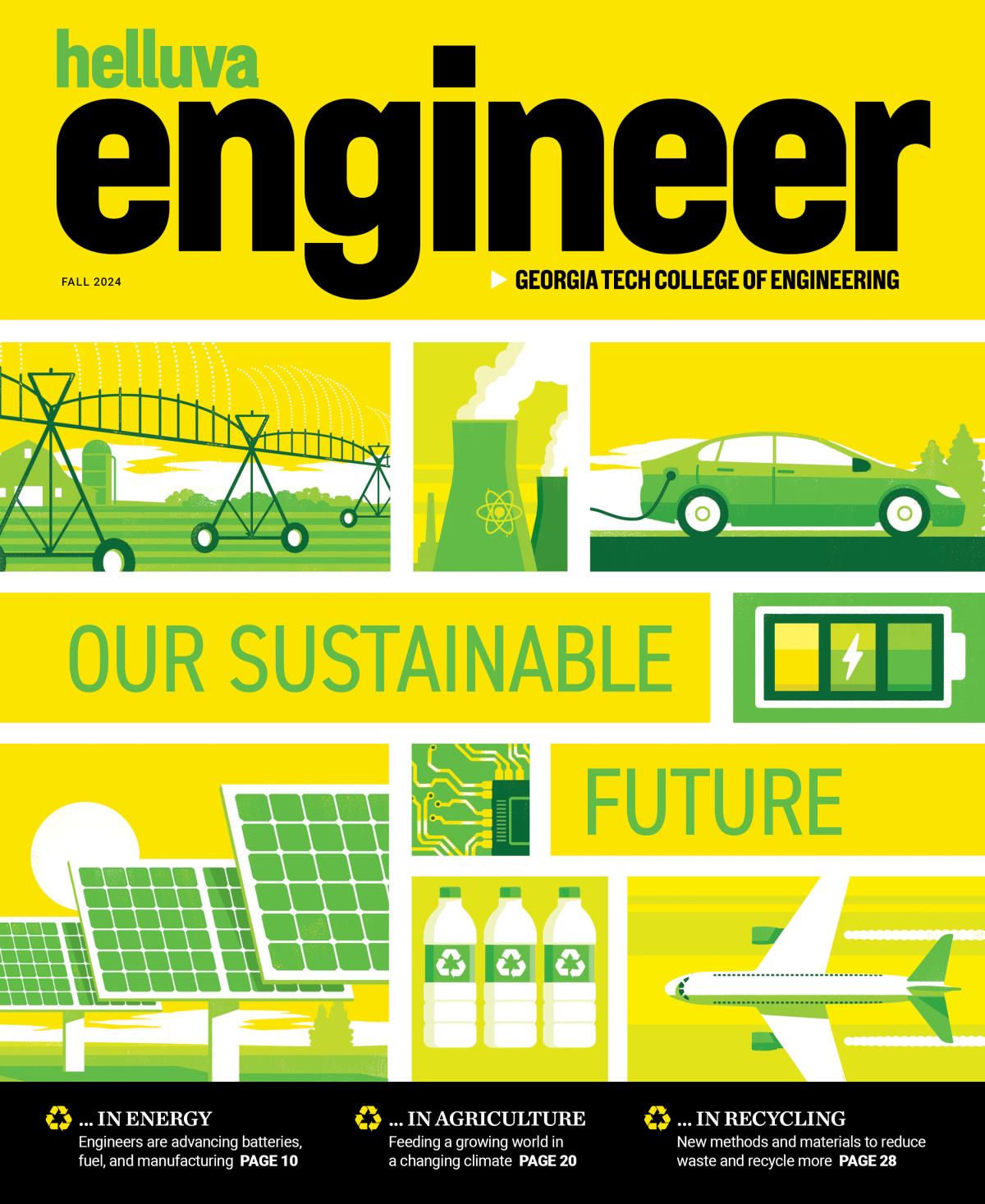
Helluva Engineer
This story originally appeared in the Fall 2024 issue of Helluva Engineer magazine.
In a world with more people, more energy needs, and more waste than ever, Georgia Tech engineers are hard at work developing the tools and technology for everyone to thrive. We’re diverting trash from landfills and taming plastic pollution (while finding alternatives to plastic in the first place). We're reducing the environmental impact of agriculture and finding new ways to fertilize the fields growing food for a growing world. And engineers are powering up the batteries, fuels, and renewable sources to meet surging energy demand. The future is coming; we're making it more sustainable.